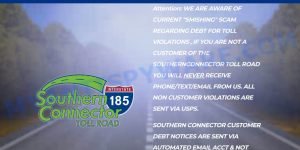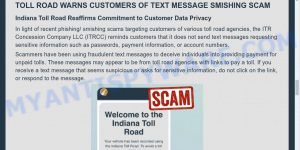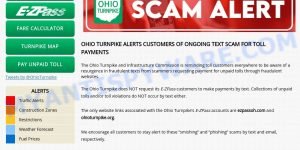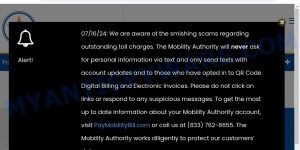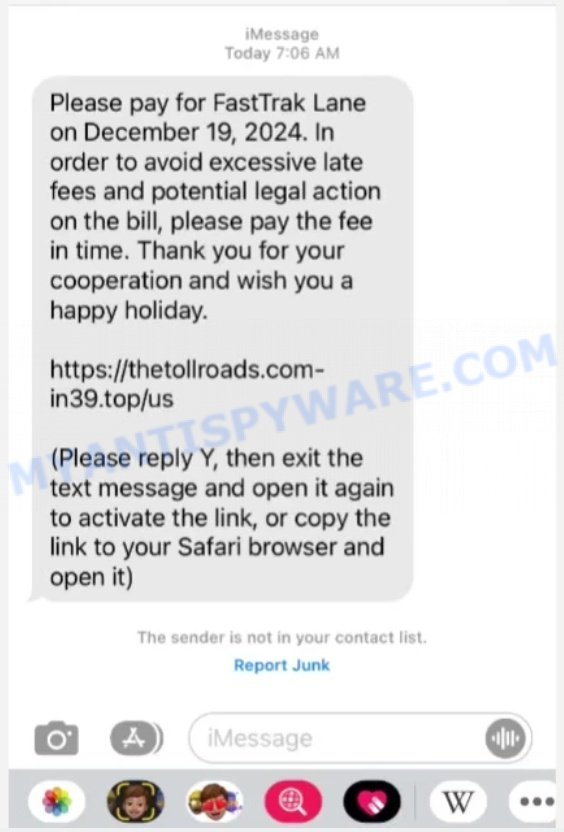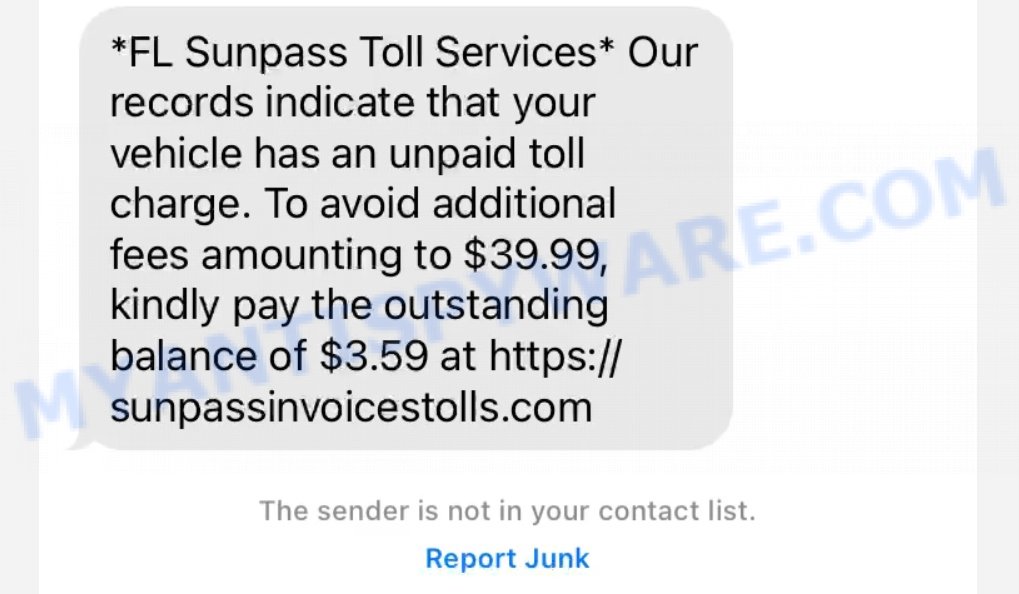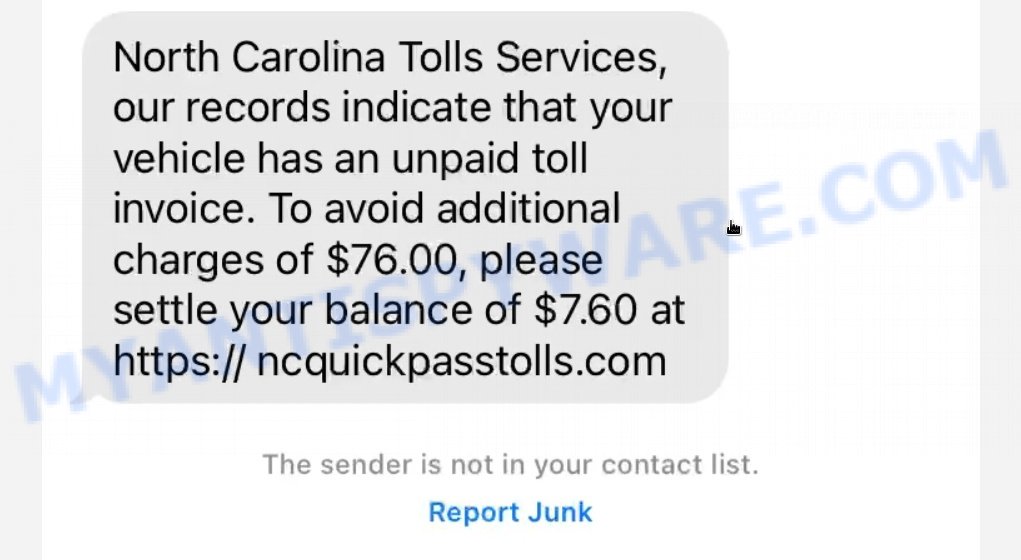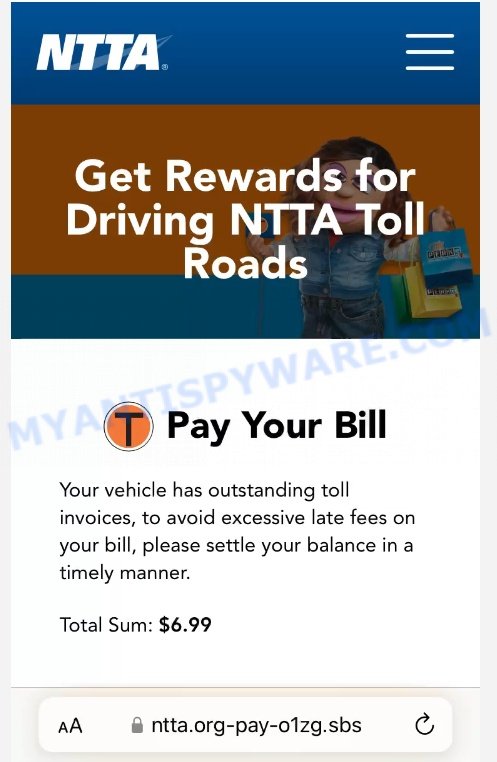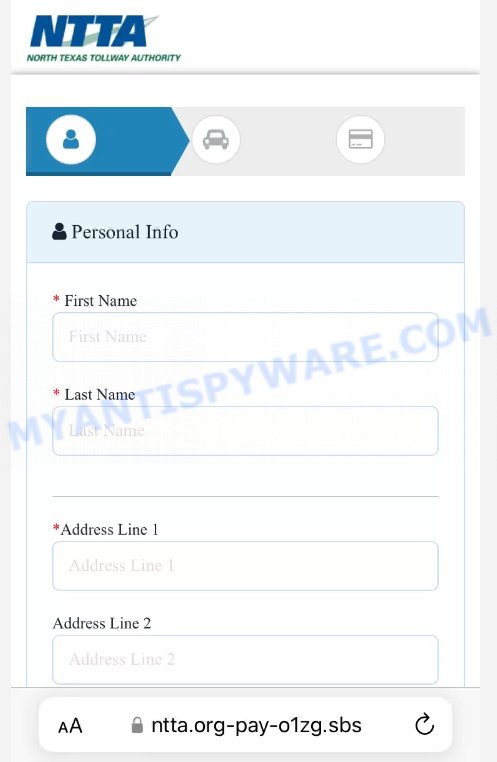Have you received a text message claiming that you need to pay for a ZipCash Lane usage to avoid hefty late fees and even legal trouble, asking you to visit a link like “hxxps://ntta.org-pay-o1zg.sbs/us”?
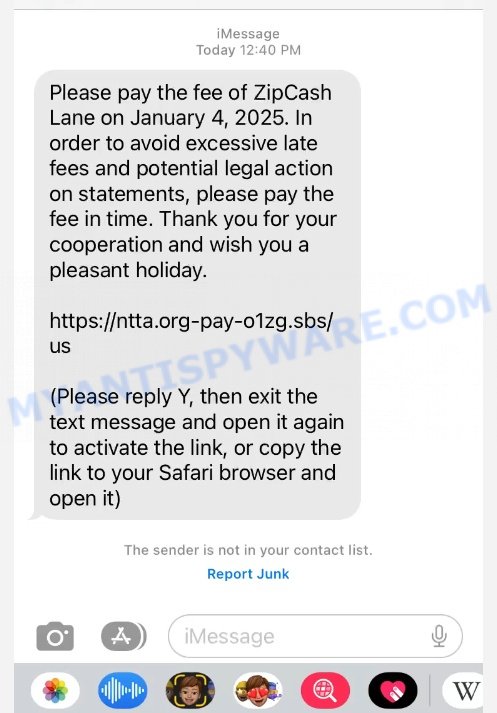
Question: Is this text genuine and from the North Texas Tollway Authority (NTTA)?
Investigation Findings: This message is actually a scam. The message aims to scare you into paying a fee by impersonating the NTTA and using a phishing link. The link tries to mimic NTTA with similar design and logos but is not legitimate. Scammers often use low payment amounts like $6.99 to seem believable. They also might mention rewards to mislead users. Additionally, they include unusual instructions like replying ‘Y’ and reopening the message, which is not standard practice for real companies.
Answer:The Ntta.org ZipCash text is a fraudulent phishing scam. 💡 To protect yourself from scams like these, always verify URLs before clicking and reach out to known contact numbers for the company to confirm any payment requests. Additionally, avoid clicking links or following strange instructions in unexpected messages.
Table of Contents
🚨 Is the Ntta.org Text Message a Scam?
Yes, the text message directing you to ntta.org-pay-[xxxx.xxx] and claiming you have an unpaid ZipCash Lane toll is a scam. 🚫 If you’ve received a ZipCash Lane text message claiming you owe toll money and urging you to visit ntta.org-pay-o1zg.sbs/us (or a similarly named site) to avoid extra fees, proceed with extreme caution. These claims are false and designed to exploit your fear and urgency to trick you into entering personal and payment information on a phishing site.
Background on the NTTA ZipCash Lane Scam:
This type of scam, commonly known as “smishing” (a blend of SMS and phishing), involves criminals posing as legitimate tolling authorities such as the NTTA ZipCash system. The scammers send text messages demanding payment for supposed unpaid ZipCash Lane tolls, directing victims to fraudulent websites through the links provided in the messages.
However, NTTA and other legitimate toll agencies have confirmed they do not request toll payments or address toll violations via text message. Official communications regarding toll payments will direct users to their respective authorized websites and not through any unsolicited links sent via SMS.
The concerning rise of these scams has led various government and consumer protection organizations, including the FBI and the Better Business Bureau, to issue alerts. These scams have affected numerous states, employing similar methods to deceive individuals in California, Texas, Florida, New York, Illinois, and beyond.
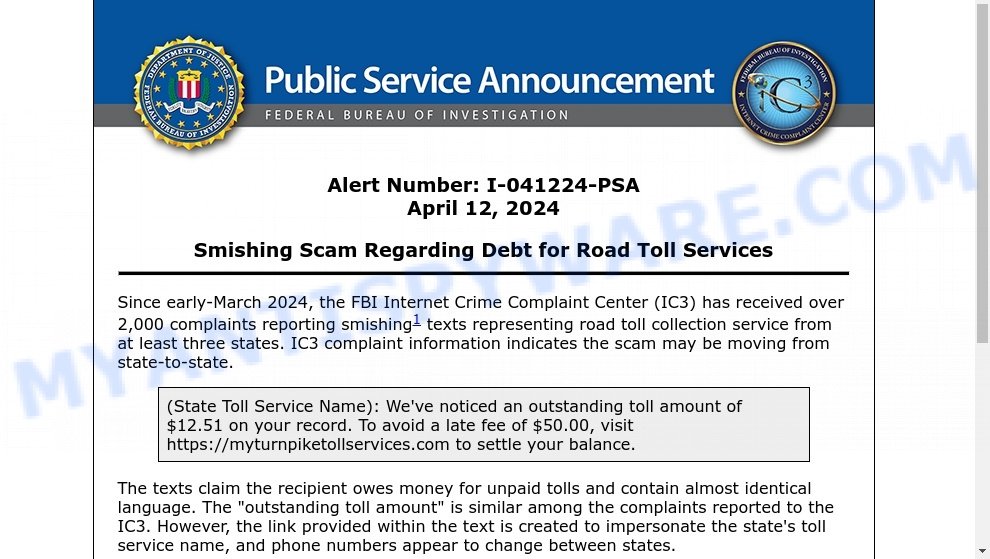
The deceptive messages typically claim there is an “unpaid toll invoice” and direct victims to a phishing website that resembles the official state toll service’s site, but its real purpose is to steal personal and financial information.
🚩 Red Flags to Watch Out For:
Be vigilant and question the authenticity of such text messages if you encounter these warning signs. 🔍🛡️
- 🔗 Unusual URL: The scam text includes a link to a website like
ntta.org-pay-o1zg.sbs/us, which is not the official NTTA URL and contains multiple dashes and a non-standard domain. - ⏳ Urgency and Threats: The text imposes a tight deadline to coerce you into acting hastily out of fear of penalties, mentioning “excessive late fees” and “potential legal action.”
- 💳 Requests for Personal and Financial Information: Be skeptical of any demands to enter sensitive information on a website linked from a text message, as legitimate agencies handle such matters through secure, official channels.
- 📲 Activation Instructions: Instructions to reply ‘Y’, exit the message, and reopen it to activate the link are unusual and suspicious, as legitimate companies do not require such actions.
- 🎉 Inappropriate Holiday Greetings: Including a holiday greeting like “wish you a pleasant holiday” is out of place in a payment request and may be an attempt to appear friendly or legitimate.
- 👤 Anonymity of the Sender: Scammers often use untraceable numbers or random letter strings as sender ID, making it difficult to verify their authenticity.
- 🔄 No Proof of Debt: Legitimate toll violations would be accompanied by official documentation, not just a text message, and would provide a clear path for verification and dispute.
🕵️♂️ How the Ntta.org ZipCash Text Scam works
The Ntta.org ZipCash Text scam is a phishing scheme designed to steal your personal and financial information by convincing you that you need to pay toll fees immediately. Being aware of how this scam operates is crucial for your safety. 💡🔐
🚨 Exploiting Your Urgency
This scam begins with a text message falsely claiming you owe money for toll road usage. It uses urgent language and threats of legal action or excessive late fees, pushing you to act quickly without questioning the legitimacy of the claim.
🔗 Suspicious Links and Instructions
The scam message includes a link to a fraudulent website that mimics official toll payment services. The URL is unusually complex and includes misleading details to make it appear trustworthy, thus tricking you into visiting the site.
🎭 Misleading Financial Demands
Upon accessing the fake site, you’ll find a demand for payment of a toll fee, often stated in a precise amount to make the claim seem legitimate. The message urges quick payment to avoid additional charges.
📥 Capturing Your Payment Information
The deceptive site requests your credit card details to “resolve” the supposed unpaid tolls. This direct approach is an effective way for scammers to gain access to your financial resources.
🔄 Creating a False Sense of Emergency
The scammers manufacture a sense of crisis, suggesting that immediate action is necessary to resolve an issue that in reality does not exist. They fake authority, implying that payment is essential to avoid further consequences.
🕳️ Intimidation and Deception
The scheme manipulates you into thinking you’re addressing a genuine problem by submitting your payment information. It may also include warnings about potential legal consequences or mounting fees to pressure you into acting swiftly.
By understanding these tactics, you can protect yourself from this and similar scams. Always verify any claims through official channels and never share personal or financial information on suspicious websites.
Steps to Take if You Receive a Toll Payment Scam Text
Receiving a scam text claiming you owe a toll payment can be alarming. However, there are straightforward actions you can take to safeguard yourself.

Action Guide Against Toll Payment Scam Texts:
Firstly, keep calm. The scam message wants to rush you into making a mistake by paying or providing personal information. Recognize it for what it is: a common fraud attempt.
Do not send any money. Paying the scammer won’t solve anything. It only puts you at risk of losing money and encourages the scammer to target you again.
Don’t reply. Interacting with the scammer in any way can reveal more about you and confirm that your phone number is active, inviting more fraudulent messages.
If the scam text mentions specific details, like a password or personal info, investigate its origin. Check if your data has been part of a leak by using sites like haveibeenpwned.com.
Next, update your passwords. Create strong, unique passwords for each of your accounts and activate two-factor authentication wherever possible for added security.
Check your device for safety. Run a scan with reliable security software to ensure your phone or computer hasn’t been compromised by malware.
Report the scam text. Inform authorities such as the FTC or your local cybercrime unit. Your report can help prevent future scams.
Lastly, inform your network. Sharing information about this scam with friends, family, and colleagues increases awareness, making it less likely for others to fall victim.
📌 How to Report Ntta.org Scam Texts
If you get a Ntta.org text message saying you owe toll fees, it’s a scam. Reporting it can help you stay safe and protect others. Here’s the simple way to report these scam texts:

🔍 Spot the Scam Text
Find the text message that seems like a scam.
👉 Use Your Phone to Report
Your phone lets you report a text as spam or scam. Press and hold the scam message to do this.
🚩 Pick the Report Option
Select the right option to report the message. This could be “Report Spam” or something similar.
📱 Tell Your Mobile Company
Send the scam text to 7726. This spells “SPAM”, and it lets your mobile company know about the scam.
🔗 Tell the Authorities
Some places let you report scam texts to the government or groups that protect consumers. Look online to find out where you can report in your area.
🛡️ What to Do Next
If you clicked on the link in the scam text, watch your accounts for any strange activity. Think about changing your passwords. You might also want to tell your bank or credit card company about the scam.
✔️ Finish Reporting
Make sure you follow all the steps your phone, mobile company, or local government asks you to complete the report.
Threat Summary
| Name | Ntta.org, NTTA Text Scam, Ntta.org ZipCash Text Scam |
| Type | Phishing |
| Scam Text Content | Please pay the fee of ZipCash Lane on January 4, 2025. In order to avoid excessive late fees and potential legal action on statements, please pay the fee in time. Thank you for your cooperation and wish you a pleasant holiday. https://ntta.org-pay-o1zg.sbs/us (Please reply Y, then exit the text message and open it again to activate the link, or copy the link to your Safari browser and open it) NTTA |
| Fake Fee | Extra fees (implied) |
| Targeted Information | Full name, address, phone number, credit card details (number, CVV, expiration date) |
| Harm | Loss of money, identity theft risk |
| How It Spreads | Mass text messaging to random or targeted phone numbers |
| Scammer’s Methods | Creating urgency, pretending to be a legitimate toll payment service |
| Variations | Different amounts claimed, various phishing website URLs |
| Protection Tips | Don’t click on links in unsolicited texts; confirm any toll charges directly through official websites; use strong passwords; enable two-factor authentication for online accounts; educate yourself on phishing signs |
| What To Do If You Receive A Scam Text | Don’t use the link in the text; verify any claims through the official site; report the scam to your mobile carrier; monitor your financial statements regularly |
| Reporting Info | Report the text to your mobile carrier by forwarding it to 7726; inform local or national consumer protection agencies; share information about the scam to warn others |
| Whois | Domain Name: ORG-PAY-O1ZG.SBS Registrant Information Registrant Name: Domain Administrator Registrant Organization: See PrivacyGuardian.org Registrant Street: 1928 E. Highland Ave. Ste F104 PMB# 255 Registrant City: Phoenix Registrant Phone: +1.3478717726 Registrant Country: US Registration Dates Creation Date: 2025-01-04 Registry Expiry Date: 2026-01-04 Technical Information Name Server: NS2.DNSOWL.COM Registrar Details Registrar: NameSilo, LLC |
😱 What to Do If You Clicked on a Scam Link
If you accidentally interacted with a text from the Ntta.org scam, it’s crucial not to panic. Follow these steps to safeguard your personal and financial information effectively.

🔐 Immediate Password Change
Immediately change the passwords for any accounts that you fear may be compromised. This includes your financial accounts, email, and any other sensitive accounts, especially if you have used similar passwords.
👀 Monitor Financial and Credit Reports
Closely monitor your bank accounts and credit reports for any unusual activities. Scammers might use your personal information to commit identity theft or unauthorized transactions.
📞 Contact Your Financial Institutions
Get in touch with your bank and credit card companies. Inform them about the scam and any actions you may have taken after interacting with the message. They can offer specific advice to secure your accounts.
🔒 Enable Two-Factor Authentication
Activate two-factor authentication for your sensitive accounts. This adds an extra layer of security, safeguarding your accounts even if scammers have obtained some of your credentials.
🚫🔗 Inform Your Contacts
Warn your friends, family, and network about the scam. Advise them to be cautious of similar messages and not to trust unsolicited texts or links, especially those claiming to be from financial institutions.
📝 Document the Scam
Record evidence of the scam, such as screenshots of the message and any interactions you had. This documentation can be useful if you need to report the incident or for future reference in case of any disputes or investigations.
👮♀️ Report to Cybersecurity Authorities
Consider reporting the incident to local cybersecurity or law enforcement authorities. While online scams are common, reporting them can contribute to broader efforts to combat such malicious activities.
📘 Stay Informed and Educated
Regularly update yourself on the latest online scams. Staying informed helps you recognize and avoid falling victim to similar tactics in the future.
🎯 Conclusion
The Ntta.org ZipCash text message is a phishing scam. The fraudsters behind this scam try to scare you into paying fake fees by sending messages that look like they’re from NTTA ZipCash, a real toll service. What is their goal? To trick you into clicking on harmful links that lead to fake websites designed to steal your personal and financial information. Falling for this scam can lead to the loss of important data, more scams aimed at you, and possible money loss.
It’s important to understand that real alerts about toll fees or money matters usually come from the actual service providers or your bank, not through unsolicited texts with suspicious links. If you get an unexpected message about toll fees or any money-related issue, it’s key to check if it’s real by contacting the service directly or going to their official website on your own.
Avoid clicking on links in text messages, and tell your friends and family about these scams. Frequently changing your passwords and adding extra security steps like two-factor authentication can greatly improve your online safety. 🛡️
